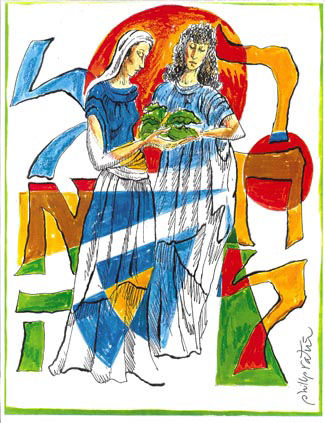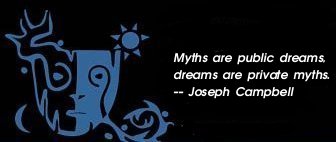

Waking Up to Leah
By Michael Karlin
Co-President — Mythic Imagination Institute
[Image:"Rachel and Leah" © Phillip Ratner and The Ratner Museum and used with permission.
Photo by Anne Parke Photography
Leah had weak eyes; Rachel was shapely and beautiful. Jacob loved Rachel... Genesis 29:17-18
So Jacob served seven years for Rachel and they seemed to him but a few days because of his love for her. Genesis 29:20
Jacob's love for Rachel is the first pre-marital love recorded in the Bible. Until that point, love was something that developed out of marriage and family. In fact, when Abraham and Sarah were first crossing into Egypt, after many years of marriage, Abraham said, "Behold, now I know that you are very beautiful..." Rabbi Shlomo Yitzacki (Rashi), the preeminent Torah commentator of the Middle Ages, comments that this is the first time that Abraham recognizes her beauty, and she was exceedingly beautiful. His love for her was based upon their relationship; the life that they had built together, not on lust or passion.
Rebecca was not even selected as a wife by Isaac. Abraham sent Eliezar, his servant, to Ur instructing, "You shall go to my land and to my birthplace, and you shall take a wife for my son, for Isaac." And when Eliezar returns with Rebecca, the Torah states, "And Isaac brought her to the tent of Sarah his mother, and he took Rebecca, and she became his wife, and he loved her. And Isaac was comforted for [the loss of] his mother." Rashi interprets this line to mean that Rebecca actually became Sarah in the tent. This was a marriage based upon common values and cultural heritage. Rebecca is veiled during this whole episode.
In contrast to these stories, we have the love story of Jacob and Rachel. The very first moment Jacob sees Rachel, he runs up to her, kisses her, and weeps. Love at first sight. Not even a "hello" before planting one on her! Her beauty is emphasized several times in the text. This is a love with an intensity never before recorded in the Bible. He is willing to work seven years with no wages for the privilege of marrying her, and these years seem merely like a few days to him because of the intensity of his love. Further, he is willing to work another seven years to marry her, when he is tricked into marrying Leah in her place.
Jacob and Rachel are the first romantic love recorded in the Bible, yet, as with most romantic love, this love is a tragic love. As discussed before, when Jacob first encounters Rachel he kisses her and begins to weep. Why does he weep? Rashi again fills in the gap by quoting the Midrash, "Since he foresaw with the holy spirit that she (Rachel) would not enter the grave with him." In other words, from the very start, he knew that this love could never be fully obtained or possessed, and that they would be separated in eternity.
 In contrast to the earlier stories of love and marriage in the Bible, the relationship of Rachel, Leah, and Jacob comes to teach us about anima. Anima, as first described by psychologist Carl Jung, is the feminine aspect of our psyche. As an inner feminine ideal, anima is projected onto a woman, who is then supposed to save us, complete us, make us whole. In fact, the quest for anima is a spiritual quest, an inner quest. When mistaken for romantic love, it often ends tragically. As Robert Johnson describes in his book We: Understanding the Psychology of Romantic Love, "Romantic love is the single greatest energy system in the Western psyche. In our culture it has supplanted religion as the arena in which men and women seek meaning, transcendence, wholeness, and ecstasy." He goes on to say, In contrast to the earlier stories of love and marriage in the Bible, the relationship of Rachel, Leah, and Jacob comes to teach us about anima. Anima, as first described by psychologist Carl Jung, is the feminine aspect of our psyche. As an inner feminine ideal, anima is projected onto a woman, who is then supposed to save us, complete us, make us whole. In fact, the quest for anima is a spiritual quest, an inner quest. When mistaken for romantic love, it often ends tragically. As Robert Johnson describes in his book We: Understanding the Psychology of Romantic Love, "Romantic love is the single greatest energy system in the Western psyche. In our culture it has supplanted religion as the arena in which men and women seek meaning, transcendence, wholeness, and ecstasy." He goes on to say,
-
-
"Unless we make it conscious, unless we put it on the correct level, it absolutely possesses us and dominates us from the depths; it dissolves our human lives, relationships, and commitments; it leaves nothing in their place. The world it opens to us is rare and wonderful; it is a part of ourselves we long have needed to rediscover and touch. But as with every powerful new truth emerging from the unconscious, the love potion finds its way into the places it does not belong, destroys things that should be saved, claims more than its due."
Jacob's love for Rachel is tragic in many ways. He works for seven years only to be tricked out of marrying her. After their marriage, Rachel remains barren for many, many years. When Rachel finally does give birth, she gives birth to Joseph, whose life and loss bring Jacob a lot of pain, and she dies giving birth to her second child, Benjamin. And finally, she is buried separately from Jacob, separate from all of the other Matriarchs and Patriarchs who are all buried in the Cave of Machpelah, according to the story. On top of all of this, the story never records Rachel's love for Jacob.
Contrast this with Jacob's relationship with Leah. Her love for Jacob is emphasized throughout the story. She is incredibly fertile, bearing him seven sons and a daughter. Her love for him is so deep she even names her children based upon her longing. For example, she names her son "Reuben, for she said, 'Because the Lord has seen my affliction, for now my husband will love me.'" from the Hebrew word ra'ah. Her love is obvious and enduring. Until the very end, when she is buried in the Cave of Machpelah side-by-side with Jacob.
Leah is the wife of this world. She is the woman with whom Jacob can create a relationship, build a family, and establish a people. Rachel is ephemeral, fleeting, and unobtainable in physical form. Leah represnts the fourth level of love in Hinduism and Rachel the fifth, as written by Joseph Campbell in The Campbell Companion:
-
-
The fourth degree of love is that of spouse to spouse, and here there is the business of the androgyne, of identification with the Other. You have found the god in your heart, and now the god is found in this intimate and most enduring kind of relationship. That's why marriage is regarded, in such traditions, as a permanent affair. There is only one chance to have this type of experience. The Catholic nun wears the wedding ring of her spiritual marriage to Christ. Their relationship is to this invisible spouse, which on the spiritual level is good enough. So too is every marriage in love spiritual. In the words attributed to Jesus, "The two shall be one flesh." For the "precious thing" then is no longer oneself, one's individual life, self-transcended in that knowledge...
-
-
Then we come to the highest order of love, the fifth, and that is compulsive, uncontrollable, illicit love, where there is nothing but love and you are totally ripped out of yourself in relation to God. You are le fou, the crazed one who's gone mad with love.
Jacob's tragedy, as with many of us, was his attempt to try and possess his anima in physical form. He does this at the expense of his happiness and to the neglect of his real world life partner, Leah. The total annihilation of self that occurs in the first instances of romantic love is beautiful and necessary in finding a life partner. This ecstatic love must then be transformed into an enduring love that can build relationship, family and people. We must still seek anima, but this is an inner, spiritual quest. "And it came to pass in the morning, and behold she was Leah!" We must be willing to go to bed with Rachel, and wake up to Leah.
Return to Passages Menu
Subscribe to the Passages e-newsletter
|

